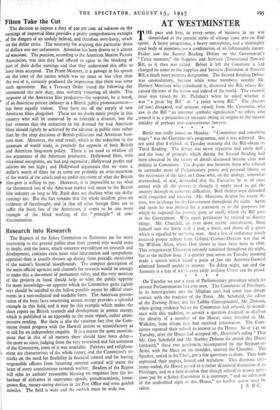AT WESTMINSTER
THE pace and heat, in every sense, of business in no way diminished as the present series of sittings came into its final sprint. A heavy programme, a heavy atmosphere, and a thoroughly tired body of members are a combination of an inflammable nature. Friday saw the Second Reading Debate on the Government's " Crisis measure," the Supplies and Services (Transitional Powers) Bill, as it then was called. Before it left the Commons it had changed its name to the Supplies and Services (Extension of Powers) Bill, a much more accurate designation. The Second Reading Debate was- unsatisfactory, because while some members, notably Mr. Herbert Morrison who introduced it, discussed the Bill, others dis- cussed the state of the nation and indeed of the world. The essential issue was raised by Mr. Pickthom when he asked whether it was " a great big Bill" or " a teeny weeny Bill." The doctors (of law) disagreed, and opinions varied, from Mr. Crossman, who saw in the Bill " an immense symbolic significance," to others who treated it as a precautionary measure owing its origins to the natural timidity of perhaps over-conscientious lawyers.
* * * *
Battle was really joined on Monday. "Committee and remaining stages" was the Government's programme, and it was achieved. But not until after 8 o'clock on Tuesday morning did the Bill obtain its Third Reading. The debate was never repetitive and rarely dull ; and the issue of principle which during the Second Reading had been obscured by the variety of details discussed became clear and definite in Committee. The dispute was between those who refused to surrender more of Parliamentary power and personal liberty to the necessities of the time, an-I those who, on the analogy, somewhat overworked, of war, demanded that the Executive be at all costs armed with all the powers it thought it might need to get the country through its economic difficulties. Both themes were defended with eloquence and sincerity. Mr. Morrison, despite his recent ill- ness, was in charge for the Government throughout the night. Again and again he was pressed for a statement as to the purposes for which he required the powers, great or small, which the Bill gave to the Government. With equal pertinacity he refused to discuss things. Mr. Churchill, an even more recent convalescent, flung himself into the battle with a zeal, a force, and above all a gusto which is equalled by no living man. And a feat of endurance which received proper tribute from Colonel Gomme-Duncan was that of Sir William Allen, whom Dod shows to have been born in 1866. This octogenarian Ulsterman not only remained throughout the night, but at the mellow hum .-f a quarter past seven on Tuesday morning made a speech which raised a point of law the Attorney-General admitted himself unable to answer. To defeat night, age and the Attorney is a feat of which even virile resilient Ulster can be proud.
* *
On Tuesday we saw a piece of Parliamentary procedure which no present Parliamentarian had ever seen. The Committee of Privileges, in its investigations into the Allighan case, had come into abrupt contact with the tradition of the Press. Mr. Schofield, the editor of the Evening News, and his Lobby Correspondent, Mr. Dobson, when giving evidence before the Committee had refused, in accord- ance with this tradition, to answer a question designed to disclose the identity of a member of the House, since revealed as Mr. Walkden, from whom they had received information. The Com- mittee reported their refusal to answer to the House. So at 3.45 on Tuesday, after the House had accepted Mr. Morrison's ruling " That Mr. Guy Schofield and Mr. Stanley Dobson do attend this House forthwith," these two gentlemen, accompanied by the Serjeant-at- Arms, with the Mace on his shoulder, entered the Chamber. The Speaker, seated in the Chair, put a few questions to them. They both expressed their regrets, bowed and withdrew. This decorous cere-
mony ended, the House passed to a rather disjointed discussion of its Privileges, and to a firm decision that though refusal to answer ques- tions put by a Select Committee is a contempt, "and an infraction of the undoubted right of this House," no further action need be


































 Previous page
Previous page